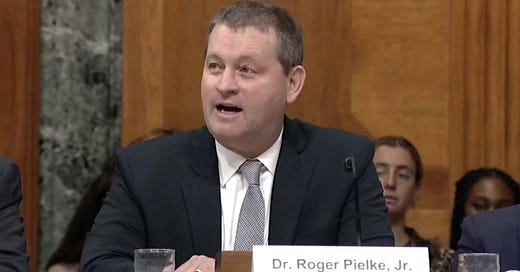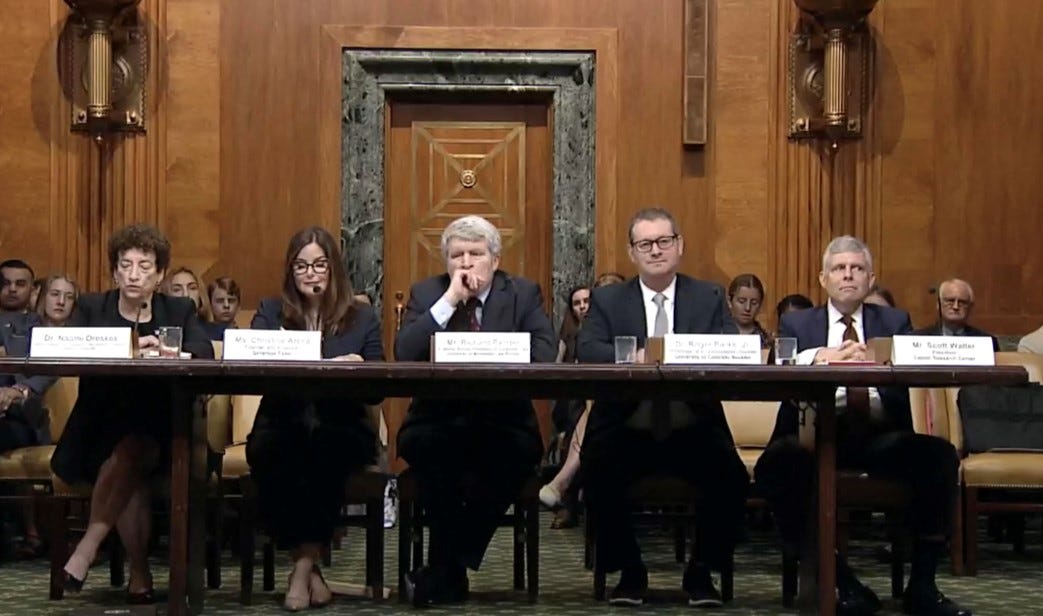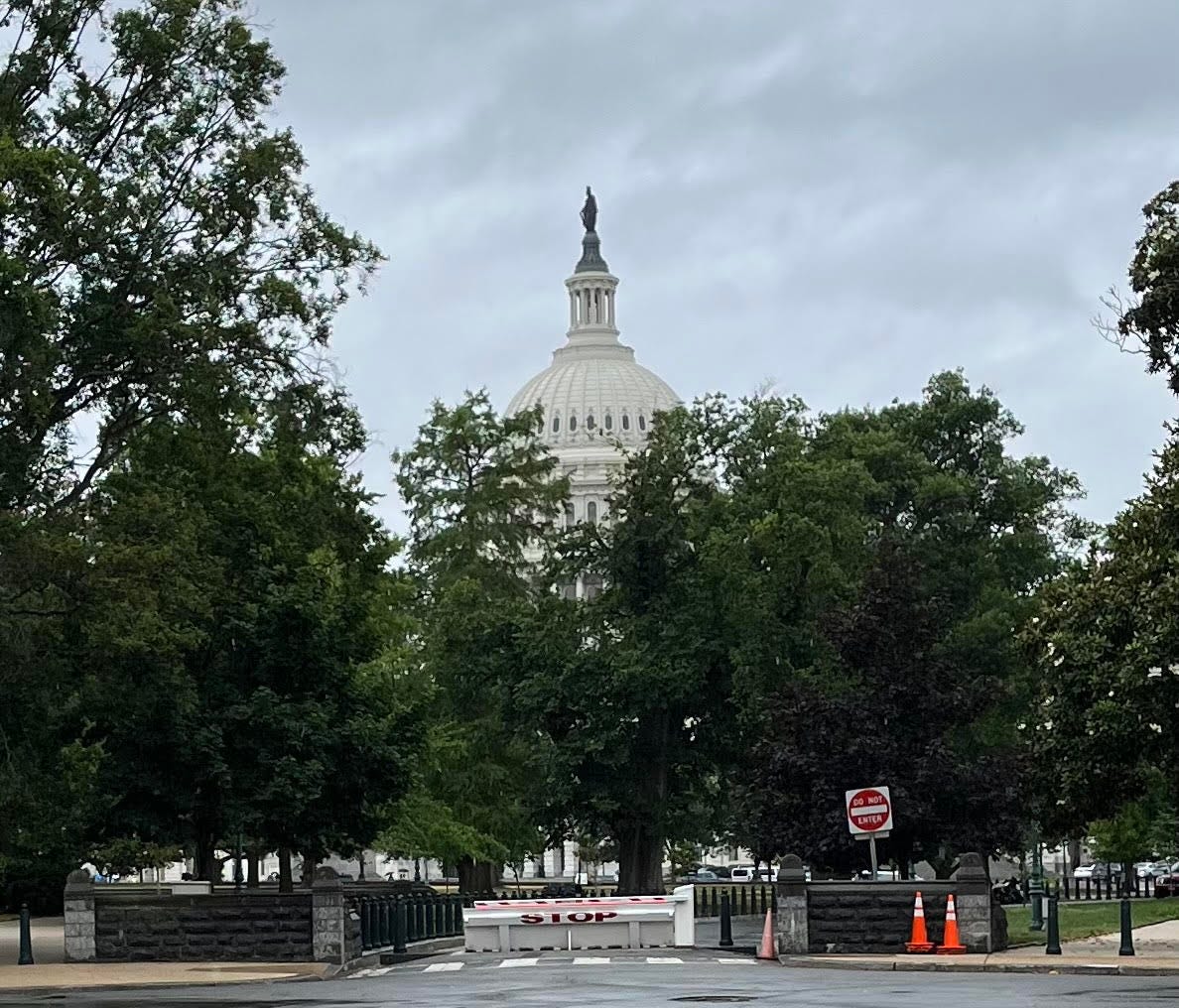Earlier today I testified before the Senate Budget Committee on misinformation in climate science. Below are my post-hearing thoughts, my opening statement, a link to my full written testimony, and a link to the full hearing video and statements.
Before all that, let me first say — Thanks! My flight, hotel, Ubers, etc. to be able to deliver this testimony was 100% supported by the paid subscribers to THB. Your support made this possible.
Post Hearing-Thoughts
Overall, the hearing was not particularly notable. It had moments of thoughtful exchanges between members and also moments of unnecessary partisan rancor. I appreciated the opportunity to emphasize the essential role of scientific integrity in producing science that is accurate and trustworthy, and that these standards apply to everyone.
I told the committee that if they remember only one sentence from my testimony it is this one: You are being misinformed. Specifically, I referred to the misuse of outdated climate scenarios and our old friends RCP8.5 and RCP4.5, which you can read about in more detail below. Readers here will know that outdated climate scenarios are a big problem.
For me, it was notable that my testimony was favorably received by Senators Chuck Grassley (R-IA) and Ron Johnson (R-WI) on the right and Senators Sheldon Whitehouse (D-RI) and Tim Kaine (D-VA) on the left.
In fact, in his closing remarks Senator Whitehouse read from a recent post The Honest Broker on conflicts of interest in climate research:
Experts monetizing their expertise is one important reason why people become experts, and there is no problem with people seeking to make a buck. But where expertise and financial interests intersect, things can get complicated. That is why there are robust mechanisms in place for the disclosure and mitigation of financial conflicts of interest . . . All of this is just common sense. Your doctor can’t prescribe you drugs from a company that pays him fees. You wouldn’t think much of a report on smoking and health from a researcher supported by the tobacco industry.
That was a pleasant surprise. I’m glad I testified and participated, hopefully constructively, in meeting the complicated, messy and difficult challenges where expertise meets politics.
My Opening Statement
Thank you Senator Whitehouse and Senator Grassley.
It is a privilege to testify today.
In 2015, following testimony I delivered before both the House and the Senate summarizing consensus conclusions of the Intergovernmental Panel on Climate Change or IPCC, a member of Congress demanded that I be investigated by my university. He suggested that I may have been receiving undisclosed funding from fossil fuel companies.
My university complied. The results of the investigation were of course not surprising to me – I was not the recipient of any funding from fossil fuel interests and never had been. However, the very public accusation was enough to upend my work and upset my career in ways that continue today.
One important role of experts is to call things as we see them. Sometimes, research results are inconvenient or uncomfortable to certain interests, and that includes political interests. Please know that I call things like I see them and no one is paying me to express certain views.
My written testimony discusses Four Take-Home Points which I will briefly summarize.
First, human-caused climate change is real, it poses significant risks to society and the environment, and both mitigation and adaptation policies are necessary and make good sense.
Second, the best and likely the only antidote to misinformation is accurate information. Successfully producing, communicating, legitimizing, and trusting accurate information to inform policy requires upholding standards of scientific integrity.
Today, there is general agreement that our current media environment and political discourse are rife with misinformation. In my areas of expertise, this is certainly the case.
The U.S. Congress has long recognized the importance of scientific integrity.
On climate, in 1990, Congress established an advisory mechanism in the form of a national climate assessment. However, locating the national climate assessment within the Executive Office of the President has made it a tempting target for political meddling under both Democratic and Republican presidents.
Third, in important areas of climate science, the self-correcting function of science has short-circuited.
The persistent misuse of climate scenarios is perhaps the most pervasive and consequential example of climate misinformation today. If there is just one sentence that you take from my testimony today it is this:
You are being misinformed.
Scenarios are inputs to projections of future changes in climate, impacts on society and the environment, and the consequences and costs of alternative possible policy actions.
However, the scenarios that are currently prioritized in climate research, assessment and policy are badly outdated.
Carbon dioxide emissions in the real world are already at a level far less than those projected in the most commonly-used climate scenarios, and that gap between scenario assumptions and reality is only getting wider.
Specifically, the most used climate scenario is called RCP8.5 which according to the IPCC represents a global temperature increase in 2100 of 4.8°C. RCP8.5 projects that all global energy consumption will come from coal. That is obviously wrong. The real world is actually tracking below a RCP4.5 scenario which represents a 2100 global temperature increase of 2.9°C.
This matters because important policy guidance relies on these outdated scenarios.
For example, the 2022 White House White Paper titled, “Climate Risk Exposure: An Assessment of the Federal Government’s Financial Risks to Climate Change” used the RCP8.5 scenario to represent where we are heading, the RCP4.5 scenario to represent successful climate policy, and the difference between the two to represent the benefits of mitigation.
All of this is wrong.
Eliminating misinformation is difficult. For instance, a widely-cited 2020 paper defending the use of the most extreme RCP8.5 climate scenario is notable because of its authors’ failure to disclose a financial conflict of interest. They were funded by a major global consultancy that relies heavily on RCP8.5 in its business promotion and services.
So far in 2023, about a dozen studies have been published every day using the outdated RCP8.5 scenario, according to Google Scholar. Misinformation has a powerful momentum.
Fourth and finally, concerns expressed about misinformation are sometimes weaponized.
One reason for this is that climate change is big business. That means it is essential that everyone follow well-established standards of scientific integrity – and this includes those funded by fossil fuel interests, renewable energy interests, and, in fact, all financial interests.
Partisans may believe that the rules apply only to their opponents. They may argue over which “side” is worse. However, bringing accurate information into the policy process means principles of scientific integrity must apply to everyone.
Congress has an important role to play in ensuring the integrity of science.
Thank you and I look forward to your questions.
My Prepared Testimony
You can access here a video of the full hearing, the prepared remarks of the Chairman and Ranking Member, and the full written testimony of all the witnesses. As is general practice, I expect I’ll be invited to answer some follow-up questions for the record, which I will share in due course.
I welcome your comments. I’d appreciate it if you hit the little heart above and the Substack restack button. You may have seen that Substack has a new feature that allows readers to invite friends to subscribe to The Honest Broker. Invite enough friends and you can get a free subscription — I’ve included that new button below. Substack is always innovating, which is nice. Thanks again for your support!







The Guardian fabricates a quote attributed to me https://twitter.com/rogerpielkejr/status/1671672032591740935?s=46&t=WMSRPCBBWz_Ojw7zB5V3AA
Very clear statement of what is to me the most important issue of all: misuse of theoretical climate scenarios as if they were factually correct about climate in the future.